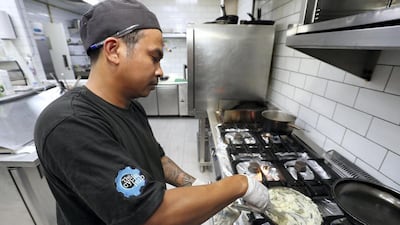New research has revealed restaurants which provide calorie information on their menus serve healthier food with less fat and sugar.
In the first study of its kind, the University of Cambridge examined 100 UK restaurant menus to assess the extent of food labelling and calorie content.
Outlets listing nutritional details on servings were found to offer food with an average of 45 per cent less fat and 60 per cent less salt than other restaurants.
Recent legislation to force larger restaurant chains in Dubai to use menu labelling was intended to be rolled out later this year, but has since been delayed to give businesses more time to comply.
Jordana Smith, a licensed dietician at Valiant Clinic in City Walk, Dubai, said the new study demonstrated the positive impact restaurants could have on healthier eating.
“We need to start educating people that eating is more than just calories,” she said.
“The focus should be on what ingredients are being used to make that menu item.
“By adding nutritional information it will make people more aware of what they are eating and may affect choices.”
Researchers at the University of Cambridge’s Centre for Diet and Activity Research (CEDAR) looked at energy and nutritional information of the most popular UK restaurant chains during March and April 2018.
Of the 100 restaurants surveyed, 42 provided some form of energy and nutritional information online. Just 13 provided menu labelling on the premises.
Researchers also found that at least three-quarters of items displayed on menus with calorie content were below the daily maximum recommended intake for energy, fat, saturated fat, sugar and salt.
However, some individual items were still found to contain more than twice the daily recommended amount for energy, fat, saturated fat, sugar or salt.
In one case, an individual dish contained 5,961 calories – almost three times the daily recommended maximum for an average adult woman.
“This research is the first study to look at differences in nutritional content of food from restaurants with and without menu labelling in the UK,” said Dolly Theis, from CEDAR and the university’s epidemiology unit.
“As well as providing useful information for customers, mandatory menu labelling could encourage restaurants to improve the nutritional quality of their menus.”
Food from restaurants and fast food takeaways are usually high in energy, fat, sugar and salt compared to home-cooked meals.
As a result, health campaigners have long been calling for restaurants to improve the nutritional information available to customers.
Mandatory menu labelling for large restaurant chains was introduced in the US in May 2018, while similar steps were discussed in the UK in 2011, but have yet to be implemented.
The expected Dubai Municipality legislation to force restaurants to provide nutritional detail on menus is part of a wider plan for a healthier UAE under the National Nutrition Agenda 2017-2021.
In a snap-shot survey conducted in Dubai this year, just one in 12 restaurants displayed calorie information in-house.
On average, adult women require between 1,600 to 2,400 calories per day, while men need slightly more - between 2,000 to 3,000 calories.
“Good nutrition is one of the keys to a healthy life,” said Dr Dinesh Dhanwal at NMC Speciality Hospital, Abu Dhabi.
“It is already mandatory to have exact nutritional content and calorie counts clearly mentioned on packaging of products in UAE grocery stores.
“These initiatives enable people to be exactly aware of the content of the meals they consume and also the calorie content of food.
“Patients with medical conditions like diabetes or hypertension for example, will definitely need to know the exact calories, sodium and saturated fats content regardless if they're eating at home or in a restaurant.”
It is almost a year since the Department of Health Abu Dhabi mandated healthcare facilities to provide healthy meal selections in cafeterias, vending machines and restaurants.
A deadline of November 29, 2018, was set for clinics and hospitals to comply with Weqaya standards, meaning prevention in Arabic.
Archana Baju, a clinical dietician at Burjeel Hospital, said expanding the programme to all food outlets in Abu Dhabi would encourage healthier meal choices.
“If this labelling or adding calorie content becomes mandatory, then restaurants and food chains will have to provide healthier choices,” she said.
“Awareness about healthy eating choices in the community, school and healthcare sectors is essential to prevent all the lifestyle diseases and promote healthy habits.”


